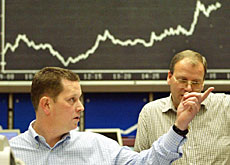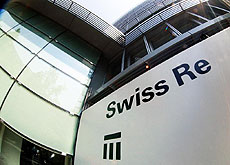Swiss Re proves investors are rarely satisfied

Reinsurance giant Swiss Re is an object lesson in how hard it is to please investors – its share price dropped despite results that roundly beat market expectations.
The dip in share price illustrates the gap between analysts, who tend to take a longer-term view of a company’s prospects, and investors, some of whom are just looking to make a quick profit.
Swiss Re, the world’s second-largest provider of insurance cover to the insurance industry (after German rival Munich Re), increased its 2004 net profit by 45 per cent to SFr2.48 billion ($2.14 billion) – nearly ten per cent higher than the average analyst’s forecast.
However, the stock market was unimpressed: the company’s share price dropped by several per cent on Thursday, after the results were released.
While it is not unusual for investors to be unimpressed by large profits – the market generally “prices in expectations” ahead of an announcement – the Swiss Re saga shows that even beating market expectations is no longer enough to keep share prices up.
The share price on any given day is affected to a large extent by short-term expectations, rather than the longer-run picture.
Tim Dawson, an analyst at Helvea in Geneva, told swissinfo that Swiss Re was probably also the victim of speculators trying to make a quick trading profit.
Many happy returns
Chief executive John Coomber certainly seemed happy with the results, when he presented them at a news conference in Zurich.
Coomber said he was delighted to announce not only a hefty net-profit hike but also a return on equity (ROE) comfortably above the company’s own target.
ROE measures the real annual profit to shareholders as a percentage of their investment. Unlike the total profit figure, it gives them a benchmark against which to measure whether they should invest their money elsewhere.
“I am pleased that, in a world where long-term bonds are yielding barely five per cent, we have ROE of 13.6 per cent,” said Coomber.
Chief financial officer Ann Godbehere added that the 2004 net profit would have been a record result were it not for exchange-rate losses – the US dollar dropped eight per cent against the Swiss franc during 2004.
Risk pays
Coomber also waxed eloquent about future prospects, going so far as to predict where the industry (and his company) might be ten years down the line.
“The risk business is a growth business,” he said. “Indeed, viewed with the perspective of time, this is a business with very predictable growth – it grows at the same rate as gross national product (GNP), plus one per cent.”
And he predicted that Swiss Re would outperform the industry as a whole over the next decade, by leveraging its financial strength, product knowledge and “people skills”.
Coomber said the company’s global market share had increased from 8.8 per cent to 10.6 per cent over the past decade, adding that a key area for future growth would be the booming Asia-Pacific region.
Near the top?
However, some analysts were more interested in Coomber’s prediction that the insurance industry as a whole was currently nearing the top of its “pricing cycle”, indicating that the next year or two might see a temporary decline in profits.
They also pointed out that, while this year’s dividend payment to shareholders was SFr1.60 per share – up 45 per cent in line with net profit – Swiss Re did not make any announcement about a share buyback programme.
Buyback programmes, announced by many large Swiss companies this year, further increase return to shareholders by decreasing the number of shares among which net profit is divided.
“Apparently there were a lot of hedge funds [who bought Swiss Re shares recently], because there were rumours of a big share buyback,” commented Helvea’s Tim Dawson.
“When it didn’t happen, they got out. This is probably just a short-term phenomenon.”
“The underlying trend of the result was largely in line with our forecast, and the outlook is positive – I think the stock is undervalued,” he added.
swissinfo, Chris Lewis in Zurich
Swiss Re is the world’s second biggest reinsurer, and the largest in the life and health sector.
2004 net profit was SFr2.48 billion, on total revenue of SFr36.09 billion.
It has three business groups: Property & Casualty, Life & Health and Financial Services.
Reinsurers offer insurance to insurers, to help them diversify risk.
Swiss Re reported a 45 per cent rise in net profit to SFr2.48 billion – nearly ten per cent above analysts’ average forecast.
But that still wasn’t enough to stop the share price dropping when the results were announced.
One explanation is that speculators tried for a short-term profit – but rumours of a share buyback proved to be unfounded.

In compliance with the JTI standards
More: SWI swissinfo.ch certified by the Journalism Trust Initiative


You can find an overview of ongoing debates with our journalists here . Please join us!
If you want to start a conversation about a topic raised in this article or want to report factual errors, email us at english@swissinfo.ch.